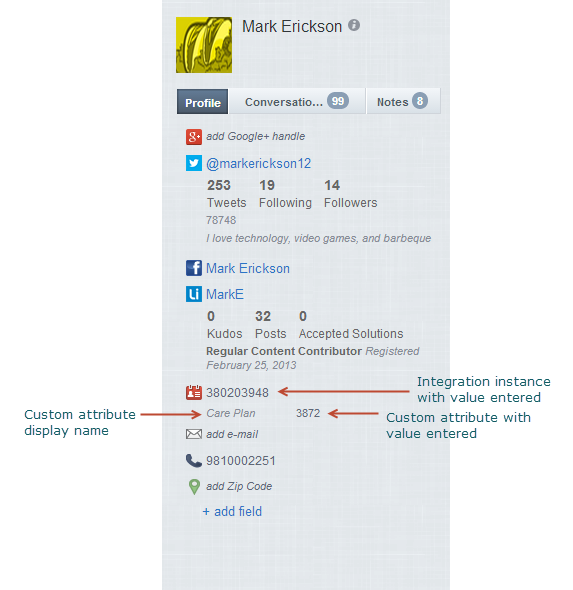Author attribute integration
Learn how to integrate author attributes from a CRM system into Care using the Author API
Khoros Care customers all have one or more CRM systems where they store their customer information. When Care agents interact with an author, they need to know a wide array of information about that author, such as account numbers, home location, email address, phone numbers, services they subscribe to, and so on. With a full complement of data, the agent can help the customer quickly, without having to go to another application to find data, or ask repetitive questions that degrade the customer service experience.
The Author API enables integration between Khoros Care and CRMs to create associations that improve customer experience and agent efficiency. CRMs are the
"source of truth" for your customer data. With CRM/Care integration, however, Care can become an aggregated source truth that spans an author across different touchpoints in addition to the CRM system.
Configuration requirements
Before you can use the API to post, put, or get CRM author data, Khoros must
configure the integration instance and any custom attributes. We call this Author Integration.
- Identify the author attributes stored in the CRM to bring into Care.
- Open a ticket with Support and provide the following information so that we can configure the author integration on the back end:
For each author integration instance (i.e. CRM instance) provide:
- A unique integration name (key) for instance. This should be specific to a particular instance. This name will be used internally by Khoros, as well as by developers making API calls to post, put, and get Author data. This key should have no spaces or special characters.
- A display name for the instance of the CRM. This name will display in the Author Profile and is visible in the Care user interface.
- Whether you want the instance value entered by the agent to connect the agent to a particular display, such as a user record in the CRM system user interface. If so, provide us with the URL pattern and specify where the value of key passed fits into the URL so that we can construct the URL properly.
Define custom CRM author attributes
You can define custom CRM author attributes associated with an author integration instance.
For each custom CRM author attribute provide:
- A unique name (key) for the attribute. This will be used internally by Khoros as well as by developers in API calls to post or put custom CRM author attributes. This key should not contain spaces or special characters.
- A display name for the attribute. This will appear in the Care user interface.
- Whether or not you want the attribute to be visible to the agent in the Author Profile. If it is not visible to the agent, the attribute can still be accessed in the user interface for things like tagging.
- The data type of the attribute: Integer, Double, Boolean, Date, or String
- Whether this attribute will link to a record by a URL. If so, specify the URL pattern and where that attribute value appears in the URL. Note that this could also be a mailto pattern. Example: https://your_crm_system.com/nba/{author.profileValue}
Note
Two author integrations cannot use the same custom CRM author attribute key. The attribute keys must be unique across all author integrations.
The following image is an example of how the attributes you define will appear in the Care agent user interface.

Custom attributes in the Response UI
Next steps
After the configuration is complete, you will be ready to begin your Author API integration calls. You might find it useful to get all existing Author resources, but most likely you will make a series of PUT calls passing Facebook, LinkedIn, Khoros Community, or other source channel handles/usernames or IDs with CRM data to join with the record passed in the JSON. For any handle/username or ID passed in a PUT that does not currently exist in Care, a new Author resource will be created and joined with the data in the JSON.
Updated 6 months ago